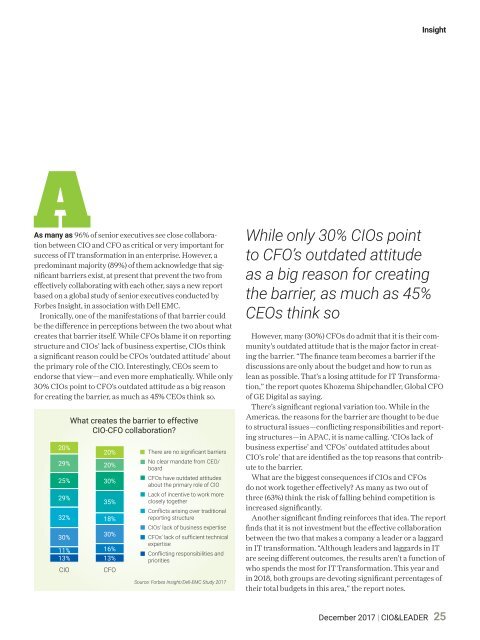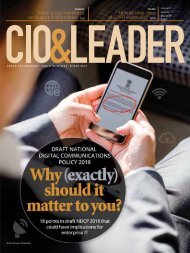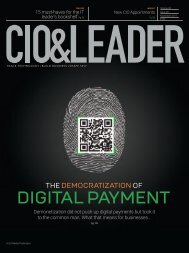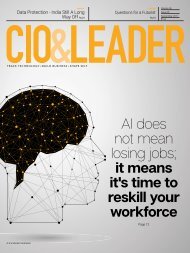C&L_December 2017 (1)
You also want an ePaper? Increase the reach of your titles
YUMPU automatically turns print PDFs into web optimized ePapers that Google loves.
Insight<br />
AAs many as 96% of senior executives see close collaboration<br />
between CIO and CFO as critical or very important for<br />
success of IT transformation in an enterprise. However, a<br />
predominant majority (89%) of them acknowledge that significant<br />
barriers exist, at present that prevent the two from<br />
effectively collaborating with each other, says a new report<br />
based on a global study of senior executives conducted by<br />
Forbes Insight, in association with Dell EMC.<br />
Ironically, one of the manifestations of that barrier could<br />
be the difference in perceptions between the two about what<br />
creates that barrier itself. While CFOs blame it on reporting<br />
structure and CIOs’ lack of business expertise, CIOs think<br />
a significant reason could be CFOs ‘outdated attitude’ about<br />
the primary role of the CIO. Interestingly, CEOs seem to<br />
endorse that view—and even more emphatically. While only<br />
30% CIOs point to CFO’s outdated attitude as a big reason<br />
for creating the barrier, as much as 45% CEOs think so.<br />
20%<br />
29%<br />
25%<br />
29%<br />
32%<br />
30%<br />
11%<br />
13%<br />
CIO<br />
What creates the barrier to effective<br />
CIO-CFO collaboration?<br />
20%<br />
20%<br />
30%<br />
35%<br />
18%<br />
30%<br />
16%<br />
13%<br />
CFO<br />
There are no significant barriers<br />
No clear mandate from CEO/<br />
board<br />
CFOs have outdated attitudes<br />
about the primary role of CIO<br />
Lack of incentive to work more<br />
closely together<br />
Conflicts arising over traditional<br />
reporting structure<br />
CIOs' lack of business expertise<br />
CFOs' lack of sufficient technical<br />
expertise<br />
Conflicting responsibilities and<br />
priorities<br />
Source: Forbes Insight/Dell-EMC Study <strong>2017</strong><br />
While only 30% CIOs point<br />
to CFO’s outdated attitude<br />
as a big reason for creating<br />
the barrier, as much as 45%<br />
CEOs think so<br />
However, many (30%) CFOs do admit that it is their community’s<br />
outdated attitude that is the major factor in creating<br />
the barrier. “The finance team becomes a barrier if the<br />
discussions are only about the budget and how to run as<br />
lean as possible. That’s a losing attitude for IT Transformation,”<br />
the report quotes Khozema Shipchandler, Global CFO<br />
of GE Digital as saying.<br />
There’s significant regional variation too. While in the<br />
Americas, the reasons for the barrier are thought to be due<br />
to structural issues—conflicting responsibilities and reporting<br />
structures—in APAC, it is name calling. ‘CIOs lack of<br />
business expertise’ and ‘CFOs’ outdated attitudes about<br />
CIO’s role’ that are identified as the top reasons that contribute<br />
to the barrier.<br />
What are the biggest consequences if CIOs and CFOs<br />
do not work together effectively? As many as two out of<br />
three (63%) think the risk of falling behind competition is<br />
increased significantly.<br />
Another significant finding reinforces that idea. The report<br />
finds that it is not investment but the effective collaboration<br />
between the two that makes a company a leader or a laggard<br />
in IT transformation. “Although leaders and laggards in IT<br />
are seeing different outcomes, the results aren’t a function of<br />
who spends the most for IT Transformation. This year and<br />
in 2018, both groups are devoting significant percentages of<br />
their total budgets in this area,” the report notes.<br />
<strong>December</strong> <strong>2017</strong> | CIO&LEADER<br />
25














